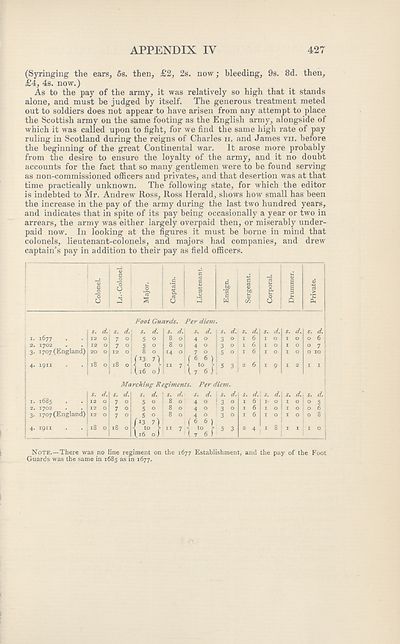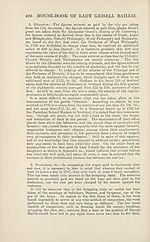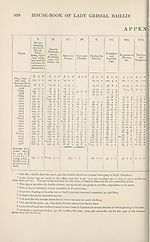Series 2 > Household book of Lady Grisell Baillie
(540) Page 427
Download files
Complete book:
Individual page:
Thumbnail gallery: Grid view | List view

APPENDIX IV
427
(Syringing the ears, 5s. then, £2, 2s. now; bleeding, 9s. 8d. then,
£4, 4s. now.)
As to the pay of the army, it was relatively so high that it stands
alone, and must be judged by itself. The generous treatment meted
out to soldiers does not appear to have arisen from any attempt to place
the Scottish army on the same footing as the English army, alongside of
which it was called upon to fight, for we find the same high rate of pay
ruling in Scotland during the reigns of Charles n. and James vn. before
the beginning of the great Continental war. It arose more probably
from the desire to ensure the loyalty of the army, and it no doubt
accounts for the fact that so many gentlemen were to be found serving
as non-commissioned officers and privates, and that desertion was at that
time practically unknown. The following state, for which the editor
is indebted to Mr. Andrew Ross, Ross Herald, shows how small has been
the increase in the pay of the army during the last two hundred years,
and indicates that in spite of its pay being occasionally a year or two in
arrears, the army was either largely overpaid then, or miserably under¬
paid now. In looking at the figures it must be borne in mind that
colonels, lieutenant-colonels, and majors had companies, and drew
captain’s pay in addition to their pay as field officers.
427
(Syringing the ears, 5s. then, £2, 2s. now; bleeding, 9s. 8d. then,
£4, 4s. now.)
As to the pay of the army, it was relatively so high that it stands
alone, and must be judged by itself. The generous treatment meted
out to soldiers does not appear to have arisen from any attempt to place
the Scottish army on the same footing as the English army, alongside of
which it was called upon to fight, for we find the same high rate of pay
ruling in Scotland during the reigns of Charles n. and James vn. before
the beginning of the great Continental war. It arose more probably
from the desire to ensure the loyalty of the army, and it no doubt
accounts for the fact that so many gentlemen were to be found serving
as non-commissioned officers and privates, and that desertion was at that
time practically unknown. The following state, for which the editor
is indebted to Mr. Andrew Ross, Ross Herald, shows how small has been
the increase in the pay of the army during the last two hundred years,
and indicates that in spite of its pay being occasionally a year or two in
arrears, the army was either largely overpaid then, or miserably under¬
paid now. In looking at the figures it must be borne in mind that
colonels, lieutenant-colonels, and majors had companies, and drew
captain’s pay in addition to their pay as field officers.
Set display mode to:
![]() Universal Viewer |
Universal Viewer | ![]() Mirador |
Large image | Transcription
Mirador |
Large image | Transcription
Images and transcriptions on this page, including medium image downloads, may be used under the Creative Commons Attribution 4.0 International Licence unless otherwise stated. ![]()
| Scottish History Society volumes > Series 2 > Household book of Lady Grisell Baillie > (540) Page 427 |
|---|
| Permanent URL | https://digital.nls.uk/126893019 |
|---|
| Attribution and copyright: |
|
|---|
| Description | Over 180 volumes, published by the Scottish History Society, containing original sources on Scotland's history and people. With a wide range of subjects, the books collectively cover all periods from the 12th to 20th centuries, and reflect changing trends in Scottish history. Sources are accompanied by scholarly interpretation, references and bibliographies. Volumes are usually published annually, and more digitised volumes will be added as they become available. |
|---|


